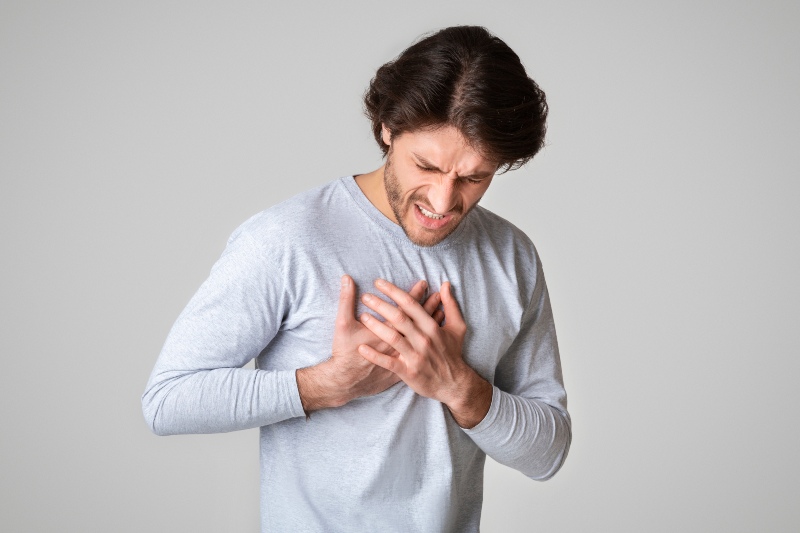Stroke vs Heart Attack | Heart Attack vs Stroke | Difference Between Stroke and Heart Attack
Stroke vs heart attack–how do they differ? If symptoms appear, will you be able to tell the difference between these two life-threatening medical emergencies?
In this article, you'll learn the difference between stroke vs heart attack, so you can recognize when one's happening.
RELATED: Angina Attack What to Do | Treatment for Angina
Stroke vs Heart Attack | How to Tell

What Is a Stroke?

Stroke, also referred to as “brain attack”, happens when blood circulation is obstructed and doesn't reach your brain. This blood flow disturbance is usually due to either:
Both of these cases lead to an insufficient oxygen and nutrient supply in your brain. When this happens, your brain cells and tissues start to die. This can cause brain damage, disability, or even death.
At times, an individual may experience a temporary clot. This can result in a transient ischemic attack (TIA), also known as “mini-stroke”. But when a clot blocks the blood flow to your brain, an ischemic stroke occurs.
On the other hand, a blood vessel in your brain may also burst or leak, which can lead to bleeding. This is called hemorrhagic stroke, which is a less common type of stroke.
According to the Centers for Disease Control and Prevention (CDC), stroke is one of the leading causes of death in the US. In fact, one out of six deaths due to cardiovascular disease is because of stroke. Each year, at least 795,000 Americans experience this serious condition.
What Is a Heart Attack?

Heart attack, also called “myocardial infarction”, happens when blood circulation is disrupted from reaching your heart.
Many heart attacks are due to coronary artery disease. This condition is caused by the fat and cholesterol buildup in the arteries that carry blood to your heart.
This plaque buildup impedes blood circulation, which forces your heart to work tougher. When this happens, your heart muscles can get damaged, or worse, fail, resulting in a heart attack.
Like your brain cells and tissues during a stroke, your heart muscle also starts to die when it doesn't receive the nutrients and oxygen it needs.
The CDC states that around 805,000 individuals in the US experience heart attack each year. Alarmingly, around one out of five heart attacks is silent. This means that the heart attack already happened, but the person isn't aware of it.
What Are the Warning Signs of a Stroke?

Understanding the signs and symptoms of stroke vs heart attack can help you determine what to do in case of emergency. This can also help the health care professionals to administer the appropriate treatment.
Although the two conditions may have a few similar symptoms, there are also some key differences between stroke vs heart attack that you must keep in mind.
The signs and symptoms of stroke vary depending on the affected part of the brain. But the most important thing you need to remember is that these symptoms are sudden.
Stroke signs and symptoms include:
- severe headache, which comes out of nowhere
- sudden dizziness
- sudden confusion
- having trouble speaking or understanding language
- sudden blurred vision in one or both eyes
- sudden balance problems, which can make it hard for you to move or walk
- sudden numbness or weakness on one side of your face or body
However, it may be a bit difficult or confusing to remember all the symptoms of a stroke. This is why as an alternative, you may remember the acronym “FAST”:
- Facial drooping: Is one side of the face numb or does it droop? Ask the individual to smile. Is one side of the smile lower than the other?
- Arm weakness: Is one arm numb or weak? Instruct the person to lift both arms. Does one arm drift downward?
- Speech difficulty: Is the person mumbling or garbling? Ask them to repeat a sentence. Do they speak unclearly?
- Time to call for emergency services: If someone's showing any of these signs and symptoms, call for emergency, and rush them to the hospital immediately.
RELATED: Protect Your Heart with These 13 Natural Blood Thinners
What Are the Warning Signs of a Heart Attack?

Stroke vs heart attack–their signs and symptoms may strike suddenly. However, the symptoms of a heart attack may build up steadily for hours, days, or weeks before the actual heart attack happens.
The most common and classic signs of heart attack are:
- tightness, discomfort, fullness, or pain in the left side or middle of the chest, which either comes and goes or lasts for a few minutes
- unexplained pain in jaw, teeth, back, neck, stomach, shoulders, or arms
- lightheadedness, weakness, or dizziness
- shortness of breath
- sweating
Some heart attack symptoms are also more common in females than males, including:
- extreme fatigue and exhaustion
- nausea and vomiting
- flu-like symptoms
Stroke vs Heart Attack–Which Is Worse?

Stroke vs heart attack–you don't want either one of them. These two serious conditions may result in total permanent disability or even death. Both can vary from mild to severe, to life-changing and life-ending.
When it comes to the mortality rate of stroke vs heart attack, the latter is more prevalent. It's the leading cause of death in the US. Meanwhile, stroke is the fifth most common cause of death in the United States and second worldwide. This means that heart attack is more fatal than stroke.
However, survivors may experience more difficulty after experiencing a stroke vs heart attack. The consequences of stroke may be harder to manage.
For instance, stroke can lead to disabilities that can alter your day-to-day activities. You might lose your ability to think and speak. You might also find it hard to move your arm and leg.
So, if you're more afraid of long-term disability than death, then you may consider experiencing stroke worse than having a heart attack.
Check out this video by the Centers for Disease Control and Prevention (CDC) to learn how statins can prevent strokes and heart attacks:
Stroke vs heart attack–they're the same in terms of the root cause, which is poor blood circulation to the vital organs in your body.
Stroke results from impaired blood flow to your brain. Meanwhile, a heart attack is caused by reduced blood flow to your heart.
Both conditions need immediate action and medical attention. But understanding the symptoms of stroke vs heart attack can make a significant difference in getting appropriate help. The faster you recognize a stroke or a heart attack, the higher the chances of recovery and survival.
So if you are or someone is experiencing either of these conditions, listen to your body, and seek the right kind of help right away.
Stroke vs heart attack–which do you think is worse? Have you experienced either of the two in the past? What have you been doing to avoid a second one? Please share with us your thoughts, experience, and the proactive steps you're taking in the comment section below!
Up Next:
- 17 Foods to Lower High Blood Pressure Without Medication
- 5 Common Health Problems For Men Over 50
- Testicular Cancer Survivor, Matt Ode, Shares His Story of Hope, Purpose, and “Winning the Day” [PODCAST]
Join the healthy living conversation with us on Facebook, Instagram, and Pinterest. We want to hear your story—let’s connect via these channels. Find our community online and join the healthy living revolution today!
Trending
Tongue Color | 7 Scary Tongue Color Meanings
Lecithin Benefits and Side Effects: 10 Surprising Truths
Get Updates
SIGN UP FOR OUR NEWSLETTER TODAY

Tongue Color | 7 Scary Tongue Color Meanings

Lecithin Benefits and Side Effects: 10 Surprising Truths

Related

Tongue Color | 7 Scary Tongue Color Meanings

